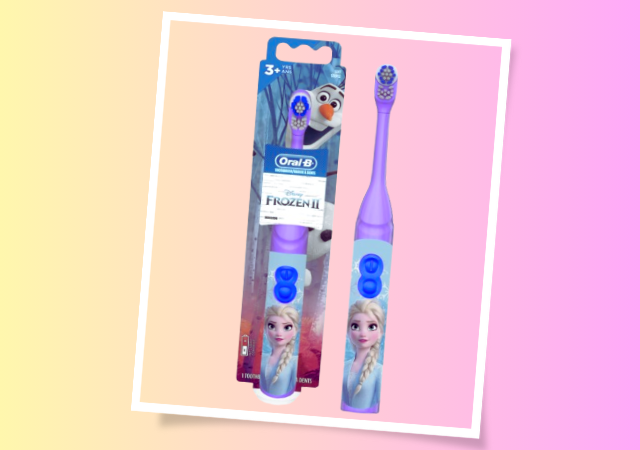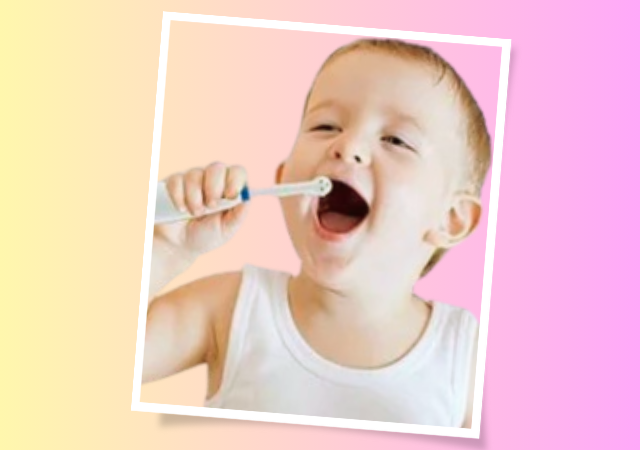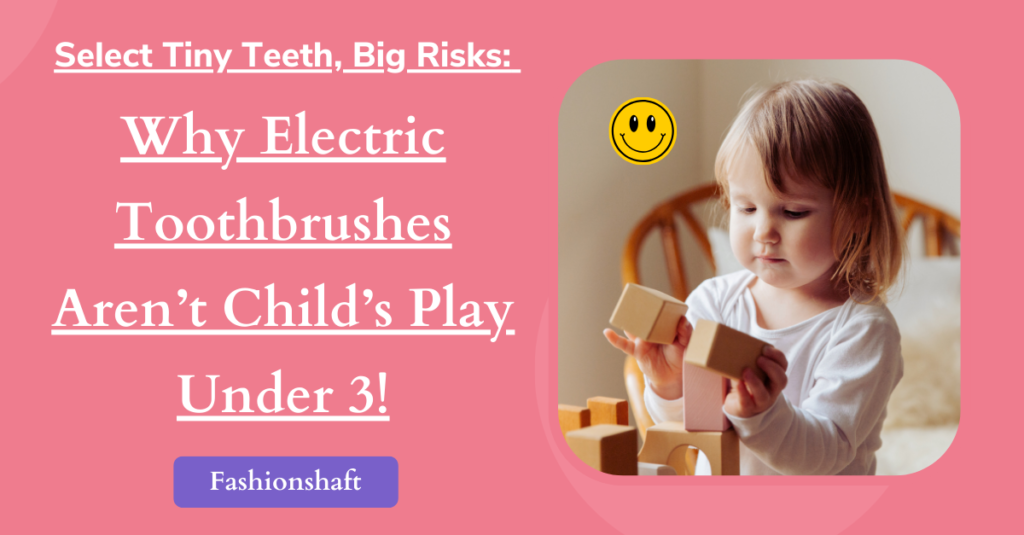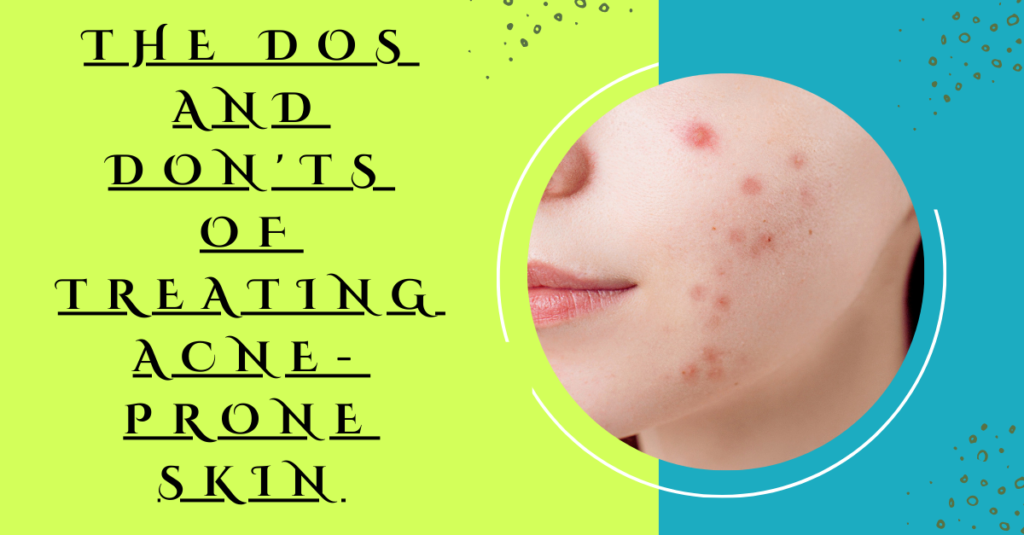Tiny Teeth, Big Risks: Why Electric Toothbrushes Aren’t Child’s Play Under 3!
Introduction
In the journey of parenting, every decision counts, especially when it comes to the health and well-being of our little ones. Among the many daily rituals, ensuring proper dental care for our children ranks high on the list. Yet, in our modern age of innovation and convenience, the allure of electric toothbrushes for even the tiniest tots is undeniable. However, as with any parenting choice, there are nuances to consider.
Welcome to “Tiny Teeth, Big Risks: Why Electric Toothbrushes Aren’t Child’s Play Under 3!” In this exploration, we delve into the delicate world of infant dental hygiene and uncover why experts caution against the use of electric toothbrushes in children under the age of three. Join us as we navigate the terrain of early oral care, shedding light on the potential risks and offering insights into safer alternatives. After all, when it comes to our precious little ones, informed decisions pave the path to a lifetime of healthy smiles.
The Delicate World of Infant Dental Hygiene
The journey to a healthy smile begins long before a child’s first tooth emerges. From the moment they enter the world, parents are entrusted with the task of safeguarding their baby’s oral health. While it may seem trivial compared to the myriad other responsibilities of parenthood, establishing good dental hygiene habits in infancy sets the foundation for a lifetime of oral wellness.
Infant dental care isn’t just about brushing tiny teeth; it’s about nurturing healthy gums, fostering positive associations with oral care, and laying the groundwork for proper technique. For newborns and infants, oral hygiene primarily involves gentle cleaning of the gums with a soft, damp cloth after feedings. As those first precious teeth make their debut, parents graduate to using a small, soft-bristled toothbrush designed specifically for infants.
The Appeal of Electric Toothbrushes

Enter the electric toothbrush—a marvel of modern innovation that promises to revolutionize the way we clean our teeth. With their oscillating bristles and pulsating movements, electric toothbrushes boast superior plaque removal and a more thorough clean compared to their manual counterparts. It’s no wonder then that parents, eager to provide the best for their children, are drawn to the allure of these high-tech gadgets.
From colorful designs adorned with beloved cartoon characters to models equipped with timers and music, electric toothbrushes for children are marketed as fun and engaging tools to make oral hygiene a breeze. Manufacturers tout their ability to capture kids’ attention, promote independence, and instill good brushing habits from a young age. And with many pediatric dentists expressing support for electric toothbrush use in older children, the transition to these sleek gadgets seems like a logical step for parents seeking to optimize their child’s dental care routine.
The Risks of Electric Toothbrushes for Children Under 3

However, while electric toothbrushes may offer undeniable benefits for older children and adults, the story changes when it comes to the youngest members of the family—those under the age of three. Despite their appeal, pediatric dentists and healthcare professionals caution against the use of electric toothbrushes in this age group, citing several key concerns.
Sensitivity of Developing Gums and Teeth
One of the primary reasons why electric toothbrushes are not recommended for children under three lies in the delicate nature of their developing gums and teeth. Infants and toddlers are particularly vulnerable to discomfort and irritation, as their oral tissues are still in the early stages of development. The powerful vibrations and rapid movements of electric toothbrushes, while effective at removing plaque, may prove too harsh for these sensitive structures, leading to potential pain or injury.
Risk of Ingestion and Choking Hazards
Another significant concern surrounding the use of electric toothbrushes in young children is the risk of ingestion and choking hazards. Many electric toothbrush models come equipped with detachable brush heads or small components that could pose a danger if accidentally swallowed. While older children may have the dexterity and understanding to use these devices safely, toddlers and infants are more likely to explore objects with their mouths, increasing the likelihood of accidental ingestion.
Excessive Reliance on Technology
Beyond the physical risks, there is also a broader concern regarding the potential implications of introducing technology into the realm of infant oral care. In an age where screens and gadgets dominate daily life, some experts worry that the early introduction of electric toothbrushes may contribute to a dependence on technology for basic tasks. Instead of fostering independence and self-care skills, reliance on electric toothbrushes at a young age could inadvertently undermine the development of manual brushing techniques and the importance of hands-on oral care practices.
Expert Opinions and Recommendations
So, what do pediatric dentists and healthcare professionals have to say about the use of electric toothbrushes in children under three? According to leading dental associations and organizations, including the American Academy of Pediatric Dentistry (AAPD) and the American Dental Association (ADA), the consensus is clear: electric toothbrushes are not recommended for children under the age of three.
Experts advise parents to opt for manual toothbrushes specifically designed for infants and toddlers, featuring soft bristles and compact heads to accommodate small mouths. When selecting a toothbrush for their child, parents should look for products labeled as “infant” or “toddler” brushes and prioritize comfort and safety over bells and whistles.
Alternatives to Electric Toothbrushes for Young Children
Fortunately, there are plenty of alternatives to electric toothbrushes that are both effective and safe for young children. Manual toothbrushes designed for infants and toddlers offer a gentle yet thorough cleaning experience, allowing parents to maintain their child’s oral health without the need for batteries or electricity.
Additionally, parents can play an active role in promoting good oral hygiene habits by incorporating fun and engaging techniques into their child’s brushing routine. From singing songs and telling stories to allowing their child to choose their toothbrush and toothpaste flavors, there are countless ways to make oral care an enjoyable experience for the whole family.
Addressing Parental Concerns and Misconceptions
Despite the wealth of information available on the topic, some parents may still harbor concerns or misconceptions regarding the use of electric toothbrushes in young children. Common worries include fears of inadequate cleaning, skepticism about the effectiveness of manual brushing, and anxiety about their child’s dental health.
It’s important for parents to remember that good oral hygiene is about more than just the type of toothbrush used; it’s about establishing a comprehensive routine that includes regular brushing, flossing, and dental check-ups. By consulting with pediatric dentists, staying informed about best practices, and prioritizing their child’s comfort and safety, parents can navigate the world of infant dental care with confidence and peace of mind.
Conclusion
In the grand tapestry of parenthood, every decision we make—no matter how seemingly insignificant—plays a role in shaping our children’s future. When it comes to their health and well-being, informed decisions are paramount. “Tiny Teeth, Big Risks: Why Electric Toothbrushes Aren’t Child’s Play Under 3!” sheds light on the importance of age-appropriate dental care practices and the potential risks associated with the premature introduction of technology into infant oral hygiene routines.
As parents, our ultimate goal is to nurture happy, healthy smiles that will last a lifetime. By prioritizing gentle, manual brushing techniques, fostering positive associations with oral care, and seeking guidance from trusted healthcare professionals, we can lay the foundation for a lifetime of optimal dental health. After all, when it comes to our precious little ones, the journey to healthy smiles begins with the gentle touch of a caring parent’s hand.

My name is Rohit Vagh and I’m a content writer specializing in fashion and lifestyle. I have three years of experience in this field and have written various articles. My writing style is creative and engaging, and I strive to create content that resonates with my readers. I have a deep passion for fashion and am constantly researching the latest trends and styles to make sure my readers are up to date. I’m excited to continue my career in blogging, and I’m always looking for new opportunities in the fashion and lifestyle space.





